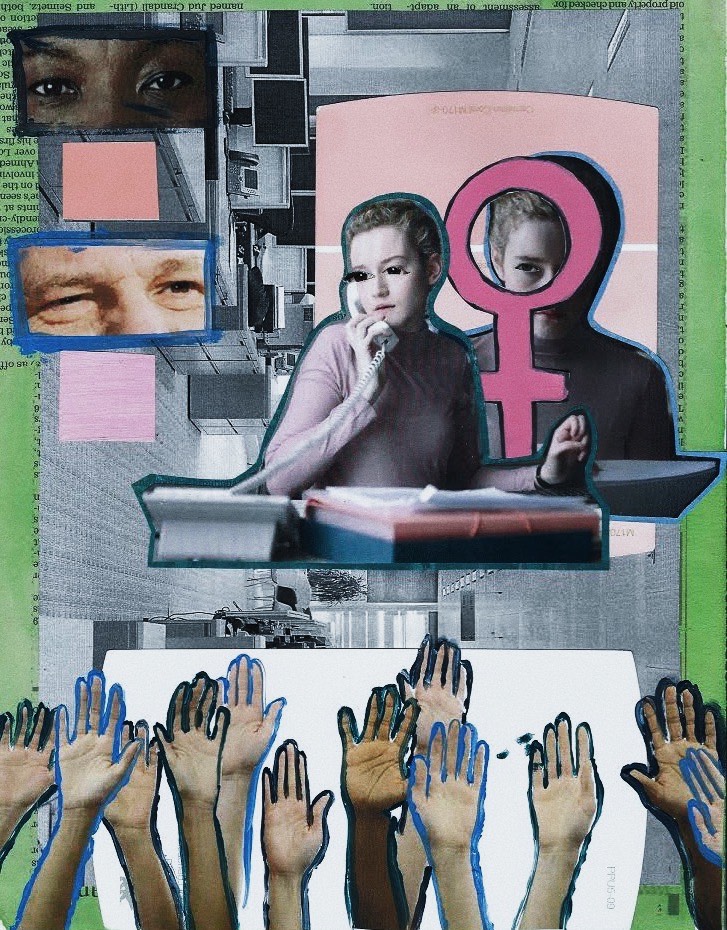Story by Remi Riordan
Art by Tina Tona
In the early morning, the cobblestone streets of TriBeCa are empty. The newly renovated apartments and condos are dark and their occupants are asleep. But a good assistant is up and on her way from Astoria, Queens. A good assistant has already begun her workday—cleaning up from the night before, drinking coffee, and eating Fruit Loops alone.
The good assistant in Kitty Green’s “The Assistant” is a young woman named Jane played by Julia Garner. She’s quiet and meek, blonde with her hair pulled back, lips pursed, eyes sad and tired. She is reserved, but sees and hears everything.
Like Jane, the film is quiet yet is hyper aware of its surroundings.
So many of the scenes throughout the film are of the mundane. Jane picking the coffee mug in the second row for its cute design. Jane making copies. Jane fixing her boss a protein smoothie.
But the way in which it is filmed, filming Jane often from above, inherently emphasizes her place within the office, specifically her lack of power in her own work environment. The small details, the mundane, the shots’ framing all serve to remind the audience of this very fact.
She is rarely praised without ridicule coming before, even though she is seen doing by far the most work of her fellow assistants. She is beaten down throughout the day by people of all ranks—her co-workers, her boss, and somehow the most insidious of them all—the company’s HR person, the only person who is truly there to listen and help.
“The Assistant” is very clearly a film referencing the #metoo movement within the film industry. It is a film that tries to shut down the question that sexual abuse apologists and deniers have used for so long—why didn’t she say anything?
And while that is not a question that can be simply answered because some women don’t say anything until much later out of fear, “The Assistant” shows audiences that many do say something—maybe not the victim of the abuse, but someone may have and they may have been fired for it or they kept quiet after being threatened.
This is what we see in the film. We see the abuse through Jane’s eyes.
She’s silently horrified and upset the entire day by the little things she sees and hears—slowly breaking down more and more. The single earring from an unknown young woman, a joke about her boss’s couch—a reference to his habit of sleeping with potential employees and actresses.
And when she does try to say something, she has her job threatened right before being assured she has nothing to worry about—she’s not her boss’s type.
Green emphasizes the complacency of Jane’s co-workers. How other women at the company, who one would hope would be equally upset and horrified, join in on jokes and at one point call a young actress “a waste of [her] time” and assures Jane that the actress will get more out of her “meeting” than her boss.
The film wants the audience to see the culture of the office and how young women are pressured to stay silent. To one day laugh at the misogynistic jokes their male co-workers crack. To see the glaring sexual harassment as a part of the industry. To see the young women affected as a waste of time.
“The Assistant” is an uncomfortable film to watch. It makes you wriggle in your seat because you know what is happening and you want to say something to Jane. You want her to quit or at the very least defend herself, but you know as well as she does that she won’t advance in her company if she does that.
The discomfort—the uneasiness of the entire film—is purposeful and necessary. Green doesn’t want audiences to leave the theater feeling good. It is not an uplifting film—it’s more an exposé of a dark and sadistic industry that sees women as disposable. The quietness, the buzzing of the lights, the printer jamming, the phone ringing, those are the sounds heard throughout the film. There is no loud orchestra or soundtrack—just the office.
Green presents the audience with a typical workday—Jane’s typical workday. It is long and depressing. But more than anything, it is ordinary.
She wants you, like Jane to be horrified at this, and we all should be.

